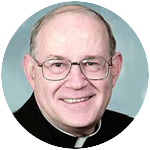
By Father Joseph J. Quindlen
Acknowledging “a time of great suffering” in the lives of abuse victims, “their families and of the entire People of God,” Pope Francis expressed his “gratitude,” offered “encouragement” and reflected on “praise,” in his Aug. 4 letter to priests on the 160th anniversary of the death of St. John Vianney, patron saint of parish priests.
To priests “confronting an endless variety of situations in your effort to care for and accompany God’s people,” Pope Francis wrote, “I want to say a word to each of you who, often without
fanfare and at personal cost, amid weariness, infirmity and sorrow, carry out your mission of service to God and to your people.”
Desiring “conversion, transparency, sincerity and solidarity with victims to become our concrete way of moving forward,” Pope Francis insisted, “We are firmly committed to carrying out the reforms needed” to encourage “a culture of pastoral care, so that the culture of abuse will have no room to develop, much less continue.
[hotblock]
“I am comforted by my meetings with pastors who recognize and share the pain and suffering of the victims and of the People of God, and have tried to find words and actions capable of inspiring hope,” he confided.
“Gratitude is always a powerful weapon,” Pope Francis emphasized.
“Only if we are able to contemplate and feel genuine gratitude for all those ways we have experienced God’s love, generosity, solidarity and trust, as well as forgiveness, patience, forbearance and compassion,
will we allow the Spirit to grant us the freshness that can renew (and not simply patch up) our life and mission.”
Expressing his gratitude to priests, Pope Francis commented, “I thank you for your fidelity to the commitments you have made … for the joy with which you have offered your lives … for working to strengthen the bonds of fraternity and friendship with your brother priests and your
bishop … for your witness of persistence and patient endurance … for celebrating the Eucharist each day and for being merciful shepherds in the sacrament of reconciliation … for anointing and fervently proclaiming to all, ‘in season and out of season’ (cf. 2 Tim 4:2) the Gospel of Jesus
Christ … for the times when, with great emotion, you embraced sinners, healed wounds, warmed hearts and showed the tenderness and compassion of the Good Samaritan (cf. Lk. 10:25-27).
“Finally, let us give thanks for the holiness of the faithful People of God, whom we are called to shepherd and through whom the Lord also shepherds and cares for us.”
Pope Francis said that his “second great desire” is to “offer encouragement as we strive to renew our priestly spirit, which is above all the fruit of the working of the Holy Spirit in our lives.”
Referring to “the prayer of Gethsemane” as “that most human and dramatic of Jesus’ prayers” where “we find supplication, sorrow, anguish and even bewilderment,” Pope Francis assured priests that “Jesus, more than anyone, is aware of our efforts and our accomplishments, our
failures and our mistakes.
[hotblock2]
“The prayer of a pastor is nourished and made incarnate in the heart of God’s people,” Pope Francis observed. “It bears the marks of the sufferings and joys of his people, whom he silently presents to the Lord to be anointed by the gift of the Holy Spirit. This is the hope of a pastor,
who with trust and insistence asks the Lord to care for our weakness as individuals and as a people.
“Our age, marked by old and new wounds, requires us to be builders of relationships and communion,” the pope said, “open, trusting and awaiting in hope the newness that the kingdom of God wishes to bring about even today.”
Reflecting on the praise that the Blessed Virgin Mary offered to the Lord throughout her life, Pope Francis credited Mary with teaching us “the praise capable of lifting our gaze to the future and restoring hope to the present.”
“Perhaps at times,” the pope concluded, “we can feel tempted to withdraw into ourselves and our own affairs, safe from the dusty paths of daily life. Our regrets, complaints, criticism and sarcasm gain the upper hand and make us lose our desire to keep fighting, hoping and loving. At those times let us look to Mary so that she can free our gaze of all the ‘clutter’ that prevents us from being attentive and alert, and thus capable of seeing and celebrating Christ alive in the midst of his people.”
***
Father Quindlen is pastor of Epiphany of Our Lord Parish, Plymouth Meeting.
PREVIOUS: Fr. Martin responds to Archbishop Chaput’s critique
NEXT: Smartphone stress points to ‘change of mind’ underway


Share this story